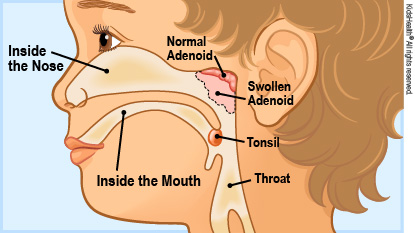Caring for Your Child After Adenoidectomy

Your child might have some throat pain and stuffy nose now that the adenoid has been removed. Any pain should gradually go away as your child recovers from surgery.


The adenoid is a patch of tissue in the back of the nasal passages. A surgeon removed your child's adenoid today, and your child is now ready to go home.
Your child may throw up a little today and have pain in the back of the nose and throat. Your child may also have neck or ear pain. This pain may get worse over the next few days, but should fade in 1 to 2 weeks.
Your child might also have congestion, a runny nose, bad breath, and noisy breathing for up to a week after surgery as the throat tissue heals. If your child snored before surgery, the snoring may continue for a few weeks because of swelling and the scab over the healing area. Your child's voice may sound muffled or nasal for a few weeks.

-
If your health care professional prescribed medicines, give them as directed.
-
Give your child the pain medicines prescribed by your health care professional as directed.
-
Your child should relax at home for 2 or 3 days and can play quietly. Avoid energetic activities (such as swimming) for the first few days.
-
Give your child plenty of clear, bland liquids, like water and apple juice.
-
Your child may prefer soft foods at first, like pudding, soup, gelatin, or mashed potatoes. Solid foods can be offered when your child is ready.
-
Ask your health care professional if there are any restrictions on diet.
-
If your child's nose is stuffy, ask your health care professional if a cool-mist humidifier might help make him or her more comfortable. Clean the humidifier daily to avoid growth of mold.
-
Your child should avoid nose-blowing and spitting for 2 weeks after surgery to prevent bleeding.

Your child:
-
Has a fever of 101.5°F (38.6°C) or higher.
-
Vomits after the first day or after taking medicine.
-
Has neck pain or neck stiffness not relieved with pain medicine.
-
Refuses to drink.
-
Isn't urinating (peeing) at least once every 8 hours.

-
Your child appears dehydrated; signs include dizziness, drowsiness, dry or sticky mouth, sunken eyes, producing less urine or darker than usual urine, crying with little or no tears.
-
Blood drips out of the nose or coats the top of the tongue for more than 10 minutes or if bleeding occurs after the first day.
-
Your child vomits blood or something that looks like coffee grounds.